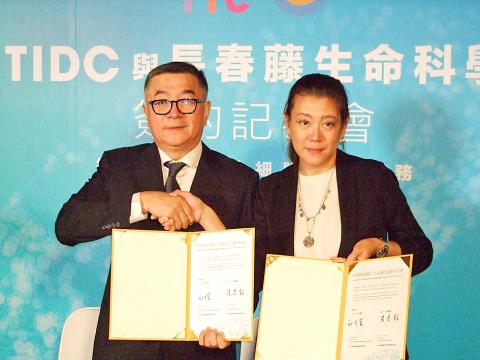Taiwan Land Development Corp (TLDC, 台灣土地開發) has partnered with Ivy Life Sciences Co (常春藤生命科學) to develp an immunotherapy business in Kinmen, with a view to attracting customers from China.
The Taipei-based developer inked a memorandum of understanding with Ivy Life to set up a cell biology laboratory on the outlying island, which could start operating in 2021 after gaining approval from heath authorities.
The joint venture, valued at NT$500 million (US$15.89 million), came after the government in September last year gave its go-ahead to special rules governing immunotherapy, a type of cancer treatment that boosts the body’s natural defenses to fight cancer.

Photo: Chen Yung-chi, Taipei Times
The Ministry of Health and Welfare on May 3 issued the first cell treatment license to Tri-Service General Hospital, allowing it to use cell-based immunotherapy with cytokine induced-killer cells (CIK) on patients, with help from Ivy Life, the only government-certified laboratory with the domain knowhow.
The deregulation makes Taiwan the first nation in Asia to tap into a business linked to cell treatment that could generate NT$10 billion in the next six months alone, Ivy Life general manager Terry Chang (張泰銘) said.
The treatment targets mainly wealthy patients with advanced lung, liver or blood cancer, as well as degenerative arthritis, cartilage defects and other illnesses, Chang said.
TLDC runs a shopping mall, Wind Lion Plaza (風獅城), in Kinmen that has become a popular attraction among Chinese tourists, TLDC chairman Chiu Fu-sheng (邱復生) said.
Kinmen is only 40 minutes from Xiamen, China, by boat.
Rich Chinese patients might desire the treatment, which can help strengthen the immune system without negative side effects, but is not yet available in China, Chang said.
A treatment course would need six to eight shots at a cost of NT$300,000 each, he said.
The laboratory would be set up in a residential complex, another part of a build-operate-transfer venture with the county government like the shopping mall, TLDC president Vicki Chiu (邱于芸) said.
Kinmen is ideal for developing tourism and preventive medicine given its scenic views and a fast-growing number of senior citizens, Viki Chiu said, as the offshore county has lost its young population to Taiwan proper.
The cell treatment could bring more tourists to Kinmen and invigorate its economy as a whole, Chiu said.

Sweeping policy changes under US Secretary of Health and Human Services Robert F. Kennedy Jr are having a chilling effect on vaccine makers as anti-vaccine rhetoric has turned into concrete changes in inoculation schedules and recommendations, investors and executives said. The administration of US President Donald Trump has in the past year upended vaccine recommendations, with the country last month ending its longstanding guidance that all children receive inoculations against flu, hepatitis A and other diseases. The unprecedented changes have led to diminished vaccine usage, hurt the investment case for some biotechs, and created a drag that would likely dent revenues and

Global semiconductor stocks advanced yesterday, as comments by Nvidia Corp chief executive officer Jensen Huang (黃仁勳) at Davos, Switzerland, helped reinforce investor enthusiasm for artificial intelligence (AI). Samsung Electronics Co gained as much as 5 percent to an all-time high, helping drive South Korea’s benchmark KOSPI above 5,000 for the first time. That came after the Philadelphia Semiconductor Index rose more than 3 percent to a fresh record on Wednesday, with a boost from Nvidia. The gains came amid broad risk-on trade after US President Donald Trump withdrew his threat of tariffs on some European nations over backing for Greenland. Huang further

Nvidia Corp’s GB300 platform is expected to account for 70 to 80 percent of global artificial intelligence (AI) server rack shipments this year, while adoption of its next-generation Vera Rubin 200 platform is to gradually gain momentum after the third quarter of the year, TrendForce Corp (集邦科技) said. Servers based on Nvidia’s GB300 chips entered mass production last quarter and they are expected to become the mainstay models for Taiwanese server manufacturers this year, Trendforce analyst Frank Kung (龔明德) said in an interview. This year is expected to be a breakout year for AI servers based on a variety of chips, as

HSBC Bank Taiwan Ltd (匯豐台灣商銀) and the Taiwan High Prosecutors Office recently signed a memorandum of understanding (MOU) to enhance cooperation on the suspicious transaction analysis mechanism. This landmark agreement makes HSBC the first foreign bank in Taiwan to establish such a partnership with the High Prosecutors Office, underscoring its commitment to active anti-fraud initiatives, financial inclusion, and the “Treating Customers Fairly” principle. Through this deep public-private collaboration, both parties aim to co-create a secure financial ecosystem via early warning detection and precise fraud prevention technologies. At the signing ceremony, HSBC Taiwan CEO and head of banking Adam Chen (陳志堅)